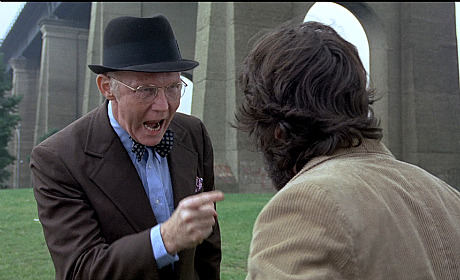Angelina Jolie isn’t just the once-estranged daughter of Hollywood’s worst saliva-drooling Tea Party nutter, Jon Voight. She may also be a closet ally of Voight’s, at least in terms of despising Barack Obama. (Call this a flimsy maybe.) She also seems to be a supporter of America’s military adventures in Iraq and perhaps also Afghanistan and…well, basically anywhere that the poor are suffering due to the deprivations of war.
Jolie’s reasoning seems to be that because these conflicts are in some ways politically and governmentally linked with humanitarian support for the downtrodden, anyone who talks about withdrawing from these areas (like President Obama) is somehow anti-humanitarian. Or something like that. Because people whose lives have been torn to shreds by the horrors of war need to be sheltered and cared for, and who better to do this than a really rich hottie who wants to provide for as many of the bruised and battered as possible?
It’s well known that Jolie has a strong personal belief in humanitarian work — a general compassion for those whose lives have been ruined by war and famine, and the ceremonial UN Goodwill Ambassador thing, of course. So her plan to spend the fall directing a low-budget love story set against the Bosnian-Serbian war of the ’90s, a conflict which devastated the lives of tens of thousands, falls right into line.
Gregg Kilday‘s 8.22 Hollywood Reporter piece about the film said Jolie “was in Sarajevo, the capital of Bosnia and Herzegovina, this past weekend, meeting with the country’s leaders to discuss the plight of the more than 113,000 displaced persons living in the country.
But Jolie’s official quote about the film, calling it “a love story [and] not a political statement” is, of course, horseshit. Anyone who has ever said these words (and they’re hardly original) has more or less lied. All movies about wars and revolutions are political statements, and…well, think about it for five or six seconds. How could Jolie make a film of this sort without her political sympathies becoming part of the mix?
I don’t know how Jolie plans to weave her allegedly conservative views into a war-torn love story (maybe weave in information about the liberal Clinton administration doing very little to help end the Serb-Bosnian slaughter?), but I wouldn’t be at all surprised if this happens.
I only know what Jon Voight has said and stands for, and that I saw him standing near his daughter and Brad Pitt inside a roped-off area at the Salt premiere after-party. And the old cliche about the acorn not falling too far from the tree flew into my mind, especially considering her rep as a closet rightie (including her alleged support for McCain during the ’08 campaign) and that “stay the course in Iraq” Washington Post article she posted in ’08. And being…okay, maybe she’s more of an Ayn Rand libertarian, given her interest in making a film version of Atlas Shrugged.
It’s fair to say that if Rush Limbaugh is singing your praises, something stinks in the kingdom of Denmark.
The basic conservative impulse is to bow down and show total allegiance to authority. This obviously links up with the old cliche about right-wing women (like Rand) being especially passionate about worshipping strong males, which is incidentally why they’re said to be so great in bed. This could be one possible explanation for those reportedly overheard sounds that suggested “an animal being killed.”
I’m not one to take unsourced Us magazine quotes as anything to rely upon, but combine the Washington Post op-ed piece with this 11.09 non-attributable quote that Jolie considers Obama to be a “closet socialist,” and I’m at least thinking “hmmm.”
The term “closet socialist”….well, what’s so bad with that? FDR was one, and he had it right in my book. Anyone who uses such a term is clearly a closet rightie. I mean, that’s a symmetrical way of looking at it.
“‘She hates [Obama],” a source close to Jolie told an Us reporter, according to the article. “She’s into education and rehabilitation and thinks Obama is all about welfare and handouts. She thinks Obama is really a socialist in disguise.”




